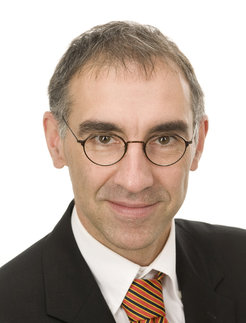Dr. Thomas Udem has been named as 2010 Fellow of the American Physical Society (APS)
He was cited as APS Fellow for his contributions to the field of precision measurement.

Being nominated by the Topical Group “Precision Measurement & Fundamental Constants” of the American Physical Society, Dr. Thomas Udem, a scientist in the Laser Spectroscopy Division at the Max Planck Institute of Quantum Optics, Garching (near Munich), was cited as APS Fellow “for contributions to the field of precision measurement including measurements of the hydrogen 1S-2S transition and the development of frequency comb techniques.” The American Physical Society, founded in 1899, is since its beginning dedicated to "to advance and diffuse the knowledge of physics". Meanwhile the society has 46000 members worldwide and is organized in fourteen divisions and nine topical groups covering all areas of physics research. Less than half of a percent of the APS members are elected as fellows, following a careful nomination and evaluation process. Therefore a fellowship represents “a distinct honor signifying recognition by one's professional peers”.
Dr. Udem studied physics at the University of Washington in Seattle (USA) and at Justus Liebig University, Gießen (Germany) where he graduated with a diploma degree in 1993. In 1994 he started to work in Prof. Hänsch’s division on his doctoral thesis entitled “Phase-coherent optical frequency measurement on atomic hydrogen. Determination of the Rydberg constant and the 1S Lamb shift.”, which he completed in 1997. After obtaining his Habilitation at the Ludwig-Maximilians-Universität München (Germany) and a post doc position at the National Institute of Standards and Technology (NIST) at Boulder (USA) he became staff scientist in the Laser Spectroscopy Division.
High precision spectroscopy of hydrogen constitutes a test of the theory of Quantum Electrodynamics (QED), which describes the interaction between light and matter. To increase the measuring accuracy to compare with very accurate theoretical predictions, Prof. Theodor W. Hänsch, Dr. Thomas Udem and Dr. Ronald Holzwarth devised the so-called frequency comb technique at the end of the nineties, which allowed optical frequencies to be directly measured. Instead of determining the wavelengths as in traditional spectrometers the frequency comb technology allows to count the very large number of oscillations per second of a laser light wave. For the development of this new measuring tool Prof. Theodor W. Hänsch, Director at MPQ and head of the Laser Spectroscopy Division, was awarded the Nobel Prize in Physics in 2005.
Meanwhile Dr. Udem is leader of a group of around 15 students and post docs in the Laser Spectroscopy Division. Some of his new projects extend high precision spectroscopy to hydrogen-like or helium-like ions such as He+ or Li+ which should allow even more sensitive tests of QED. Yet other projects aim at calibrating astronomical instruments in order to probe cosmic dynamics, e.g. to determine the proclaimed acceleration of cosmic expansion. Dr. Udem is co-recipient of the Philip Morris Research Prize 1998. In July 2005 he was awarded the endowment prize of the “Münchener Universitätsgesellschaft”, in 2006 the Röntgen Prize from Justus Liebig University, Gießen. In 2010 he was elected as Fellow of the Optical Society of America (OSA). Olivia Meyer-Streng
Further information:
Dr. Thomas Udem
Max Planck Institute of Quantum Optics
Hans-Kopfermann-Straße 1, 85748 Garching, Germany
Phone: +49 (0)89 / 32 905 -282
E-mail: thomas.udem@mpq.mpg.de
Dr. Olivia Meyer-Streng
Press & Public Relations
Max Planck Institute of Quantum Optics, Garching
Phone: +49 (0)89 / 32 905 -213
E-mail: olivia.meyer-streng@mpq.mpg.de
